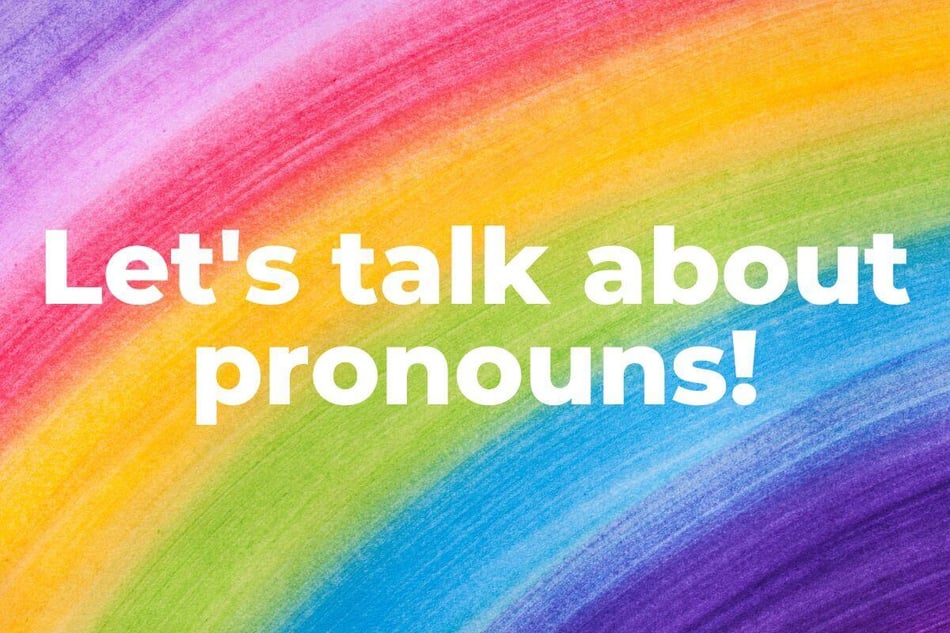June is Pride Month. A month dedicated to celebrating and honoring the LGBTQ+ community and those within it who have fought so hard for equality and acceptance. It’s important to acknowledge these acts of courage throughout the year, but Pride Month gives us a special opportunity to educate ourselves and others.
There are so many things to learn about, but something that is coming up more and more is gender pronouns in the workplace. Since pronouns continue to be in the spotlight, let’s break it down.
%20(1)%20(1).jpg?width=1200&name=Blog%20Header%20Image%20-%20Pronouns%20(3)%20(1)%20(1).jpg)
Before we dive in, I want to be clear that I am a cisgender, heterosexual female. I’m an ally to the LGBTQ+ community, not a direct member, and the things I’ve learned throughout the years have come through the amazing people I’ve met that are willing to have open conversations to educate me.
What are pronouns?
Pronouns are words used to identify an individual or an object like “she” or “it”. However, gender identity is internal, not observable. So, when we’re talking about people specifically, we can avoid uncomfortable interactions by utilizing these common pronouns:

Why do gender pronouns in the workplace matter?
Similar to the importance of calling someone by the correct name, using the correct pronoun when addressing an individual is a sign of respect. It can directly impact someone’s sense of self to be referred to by the incorrect pronoun. Utilizing them correctly creates an inclusive workplace and a safe environment for everyone.
Don’t make assumptions.
One of the best pieces of advice I’ve received on this topic is not to assume. We all know that making assumptions about anything in a person’s life can be upsetting, but assuming you know someone’s gender can lead to larger issues. It’s especially hard for someone who may be in the beginning stages of a transition from one gender to another.
When should I use gender pronouns in the workplace?
Start with your own pronouns. Opening up a conversation with someone you don’t know by saying something like, “Hi, my name is Alli and my pronouns are she/her,” automatically creates a safe space for others to share their own gender pronouns in the workplace.
Ask others to share their pronouns. It doesn’t need to be complicated — just ask! “Are you comfortable sharing your pronouns?” is a simple enough question to create a safe space and get the right information.
It’s always appropriate to ask. There really isn’t a situation in which asking someone their pronouns is the wrong path to take. As long as you’re providing your pronouns and asking in a respectful way, you’re golden. Here are some specific examples of an inclusive workplace:
-
In an interview — When you first meet over the phone, via Zoom, or in person, take a moment at the very beginning to state your name and pronouns as part of your introduction and ask them to do the same.
-
In a team meeting — We’ve all been to that group meeting where everyone goes around the room (or screen) introducing themselves. If you’re the moderator, asking attendees to include their pronouns with their names and job titles is a simple way to get the ball rolling. Even more, include your pronouns in your virtual name tag to create a space where others feel comfortable doing the same
-
At a networking event — As part of your preparation for networking, determine how you introduce yourself and include your pronouns so others feel comfortable sharing theirs.
Bonus points if you add your pronouns to your email signature!
What if I meet someone who doesn’t get it?
This is the perfect opportunity to pass on your knowledge. Provide them with some of the points in this article (or even share the link!). Hopefully, they’ll jump on board, but if they don’t, that’s up to them. You did your job by providing the right information and allowing them to make the decision for themselves. Smile and move on!
At the end of the day, we’re all learning and trying to be better humans. Admit your mistakes, but let them go and keep practicing. Take every opportunity to ask for gender pronouns in the workplace and provide your own. The more you do it, the more natural it will feel. Hopefully, it’ll catch on and our world will be a fully accepting place at some point.
Looking for an inclusive workplace to join? Check out the cultural attributes of hiring companies in the Purpose Jobs community.








